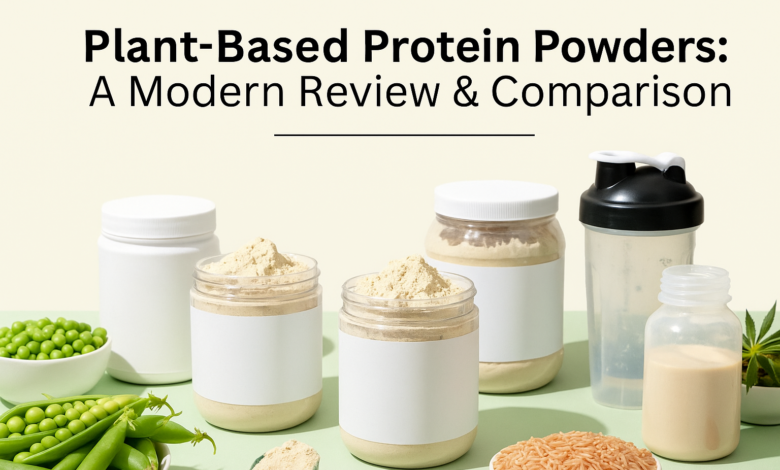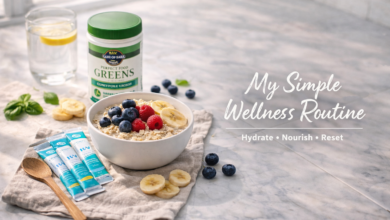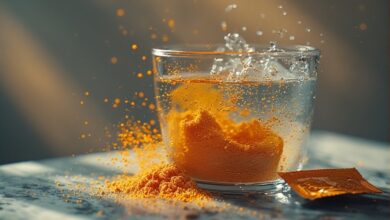Plant-Based Protein Powders: A Modern Review & Comparison

In today’s wellness-driven world, protein powders have become a staple for fitness lovers, athletes, and even those simply aiming for a healthier lifestyle. While whey protein once ruled the market, plant-based protein powders have rapidly gained traction thanks to the global shift toward sustainability, clean eating, and vegan-friendly diets. But are they really worth it? Let’s dive into a comprehensive review and comparison to see how they stand out.
🌍 Why Plant-Based Protein is Trending
The demand for plant-powered nutrition has skyrocketed in recent years. With more people adopting veganism, flexitarian diets, and eco-conscious lifestyles, plant-based protein powders are no longer a niche option. Instead, they are now mainstream, available in supermarkets, gyms, and online stores.
Consumers are drawn to them because:
- They’re dairy-free and suitable for lactose-intolerant users.
- They support sustainable farming practices.
- They align with clean label trends, often avoiding artificial additives.
In 2025, plant-based protein powders are seen not just as supplements but as lifestyle products.
💪 Nutrition Profile: Plant vs Whey
When it comes to protein quality, whey has long been praised for being a complete protein with all nine essential amino acids. However, modern formulations of plant-based powders are closing the gap.
- Pea Protein: High in branched-chain amino acids (BCAAs), making it excellent for muscle recovery.
- Brown Rice Protein: Complements pea protein by filling in amino acid gaps.
- Hemp Protein: Rich in omega-3s and fiber, offering added digestive benefits.
- Soy Protein: One of the few plant proteins that’s naturally complete.
Many brands now combine these sources to deliver a balanced amino acid profile, ensuring they rival whey in effectiveness.
⚡ Performance & Muscle Recovery
One of the main debates is whether plant-based powders support muscle building as effectively as whey. Recent studies show that blends of pea and rice protein can deliver comparable results to whey when taken consistently and in sufficient amounts.
Plant-based powders may digest slightly slower, but this can actually be a benefit for those looking for sustained energy release rather than a quick spike. Athletes, runners, and yoga enthusiasts often find them gentler on the stomach, reducing bloating that sometimes comes with whey.
🌿 Taste & Texture Experience
Taste is a critical factor for anyone committing to a daily shake. Here’s where opinions often split:
- Whey Protein: Creamy and smooth, often with a milkshake-like consistency.
- Plant Protein: Can sometimes be earthy or gritty, though newer formulas are much improved.
Brands today are working hard to make plant proteins more palatable, offering flavors like vanilla chai, chocolate fudge, and salted caramel. Many also use natural sweeteners like stevia or monk fruit to keep the shakes low in sugar but high in taste appeal.
🛒 Popular Brands & Market Trends
Several brands are making waves in 2025 with innovative plant protein formulations:
- Vega Sport: Known for clean, performance-driven blends.
- Orgain: A family-friendly option with organic ingredients.
- Garden of Life: Praised for its raw, whole-food-based approach.
- KOS: Gaining popularity for fun flavors and eco-friendly packaging.
Interestingly, brands are not just targeting athletes anymore—they’re marketing toward everyday consumers who want a quick breakfast smoothie, meal replacement, or post-workout snack.
🌟 Sustainability & Ethical Edge
One of the strongest arguments for plant-based powders is their environmental impact. Producing whey involves dairy farming, which contributes to greenhouse gas emissions and animal welfare concerns. In contrast, pea, hemp, and rice proteins are far more sustainable to produce, requiring fewer resources and supporting eco-conscious consumers.
This sustainability factor has become a powerful marketing tool and a genuine reason why many people switch from whey to plant-based powders.
✅ Pros & ❌ Cons of Plant-Based Powders
Pros:
- Vegan & lactose-free
- Eco-friendly and sustainable
- Often include extra nutrients like fiber, omega-3s, and antioxidants
- Gentler on digestion
Cons:
- Taste can be an acquired preference
- Slightly less creamy texture compared to whey
- Some options may require larger servings to match whey’s protein content
🔮 Future of Plant-Based Proteins
The future looks bright for plant-based proteins. With ongoing innovation, expect to see fermented plant proteins for better digestion, customized blends for specific fitness goals, and functional powders that include probiotics, adaptogens, or collagen-boosting ingredients.
Plant-based powders aren’t just competing with whey anymore—they’re setting new standards for what a modern, health-conscious supplement should look like.
🌱 Final Verdict: Worth the Switch?
If you’re looking for a clean, sustainable, and effective way to meet your protein needs, plant-based powders are absolutely worth considering. While whey still has a slight edge in traditional sports nutrition, the gap is narrowing fast. For eco-conscious, health-driven consumers in 2025, plant protein powders represent the perfect blend of performance, ethics, and innovation.




